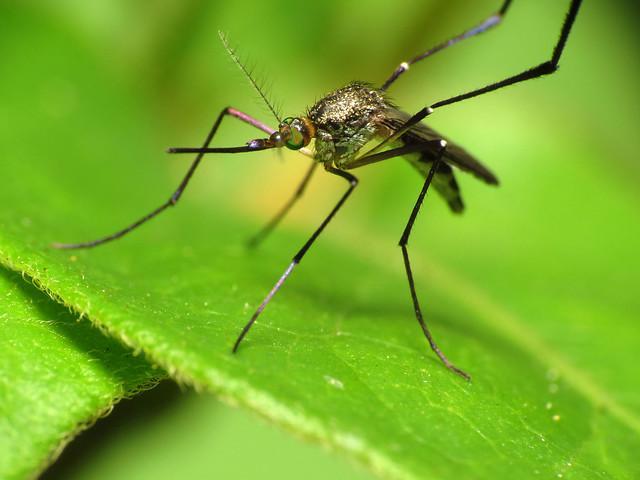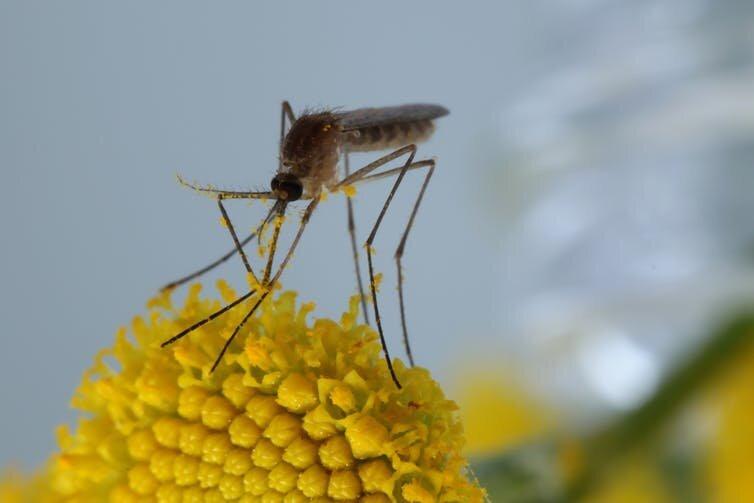Pollinators are any living or nonliving things that help with the pollination process, or the transportation of pollen grains from male plants to female plants. This article will help you learn about mosquitoes and answer the question: Do mosquitoes pollinate?
Read more: What is Pollination?
Table of Contents
Role of Mosquitoes in Pollination
Do Mosquitoes Pollinate?
The mosquito is one of the most common pests in the world, but is surprisingly also a pollinator. Because they contribute to the distribution of global diseases, mosquitoes are considered one of the greatest threats to human health. However, believe it or not, mosquitoes also play an important role in the ecosystem. Not only do they serve as food for other animals such as birds and larger insects, they also contribute to pollination. So, the answer to the question of “do mosquitoes pollinate” is yes.

Source: Katja Schulz/Flickr
How Does Mosquito Pollination Work?
Like butterflies and bees, mosquitoes’ primary food is nectar and not blood. They sip nectars from different kinds of flowers through their sucking tube called a proboscis. Due to their primary diet and rich population, they contribute greatly to pollination. Mosquitoes’ feeding activity allows pollen grain to stick to their bodies, which they then transmit to other flowers as they continue to feed.
Male mosquitoes pollinate more than females. This is due to the fact that male mosquitoes do not bite or suck on blood at all. They rely only on the rich sugar content found in flower nectars.

Source: Mike Hrabar/The Conversation
Natural Habitat
Mosquitoes can be found in almost every country in the world. However, mosquitoes thrive the most in island countries. This is due to the fact that mosquitoes prefer tropical weather conditions; mosquitoes rely on water for their reproduction and on warm climate for food resources and habitat. Brazil, Australia, Indonesia, and the Philippines have the most endemic species of mosquitoes. Though mosquitoes may be beneficial to the flora of these countries, they may also pose a significant risk to human health due to the increased probability of mosquitoes transmitting diseases such as dengue and malaria.

Source: Earth Observatory/ NASA
Mosquitoes are typically found in regions with stagnant water. Mosquitoes thrive in their natural habitat of ponds, swamps, and marshes. They may also be found on plants and trees, where they feed on nectars. Mosquitoes can also live in man-made stagnant waters in urban areas, such as abandoned tires with water in them, puddles, old containers with water, and so on. Since the flora diversity in urbanized areas is low to none, mosquito food availability lies more in animals and human blood. While they may help pollinate your garden, it is in areas with people that mosquitoes are also a threat to human health.
Lifecycle
Female mosquitoes usually lay eggs on or near the water. When the eggs hatch, they become larvae and feed on microorganisms in water. Larvae will molt up to three times before becoming pupae, which will remain in the water but will no longer eat. Instead, the mosquito pupa will just wait for its body and wings to develop. Once fully developed, the pupa will turn into a mosquito and leave the water.
Adult mosquitos spend the majority of their time eating nectar or, in the case of female mosquitoes, blood. When the temperature starts to rise, usually from spring through summer, their breeding season begins, and their life cycle process repeats again.

Threats to Humans
Mosquitoes were already swarming on Earth long before humans existed. They have been here for more than 100 million years, since the time of the dinosaurs of the Cretaceous period. In our modern-day, mosquitoes are more well-known for their role as pests than pollinators, particularly because the dangers they pose to humans outweighs the benefits of their pollination. They are considered one of the humans’ most common health threats in terms of disease transmission. Mosquitoes infect approximately 330 to 600 million people with malaria and dengue annually.
In 2019, 400,000 deaths were recorded due to malaria, while dengue infects approximately 400 million people each year. Aside from these two most common diseases, mosquitoes can also carry other viruses, including:
- Zika virus
- West Nile virus
- Yellow Fever
- Chikungunya
- La Crosse Encephalitis
- Rift Valley Fever
- Jamestown Canyon virus
- Snowshoe Hare virus
Some mosquito species, however, do not carry disease and thus simply act as pollinators.
Outbreak Prevention
There are multiple preventive measures to control the outbreak of mosquitoes in communities. Here’s all you need to know about them:
Environmental Management
By reducing mosquito populations, the risk of disease transmission they carry will be lower. Removing possible breeding grounds of mosquitoes in an area is one way to control their population. This includes the following:
- Eliminating jars and pots with stagnant waters.
- Disposing of old tires, buckets, and any plastic containers that can hold rainwater from yards and houses.
- Setting up ovitraps, mosquito traps that attract female mosquitoes to lay eggs in them rather than bodies of water, trapping the fully-grown mosquito after the development cycle is completed in the trap
Biological Control
Controlling the mosquito population naturally by utilizing predatory species that feed on mosquito larvae is another way to prevent mosquito outbreaks. This includes initiatives such as:
- Introducing copepods, which eat mosquito larvae, into mosquito breeding grounds
- Adding mosquito fish and goldfish that snack on larvae and pupae in ponds and fountains in gardens and parks
Personal Preventative Actions
Protecting yourself from mosquito bites is also important to minimize the risk of disease outbreaks caused by mosquitoes. These preventative measures include:
- Using mosquito repellents
- Sleeping under mosquito nets at night
- Regularly spraying anti-mosquito spray in houses
Read more: Are Dragonflies Pollinators?
